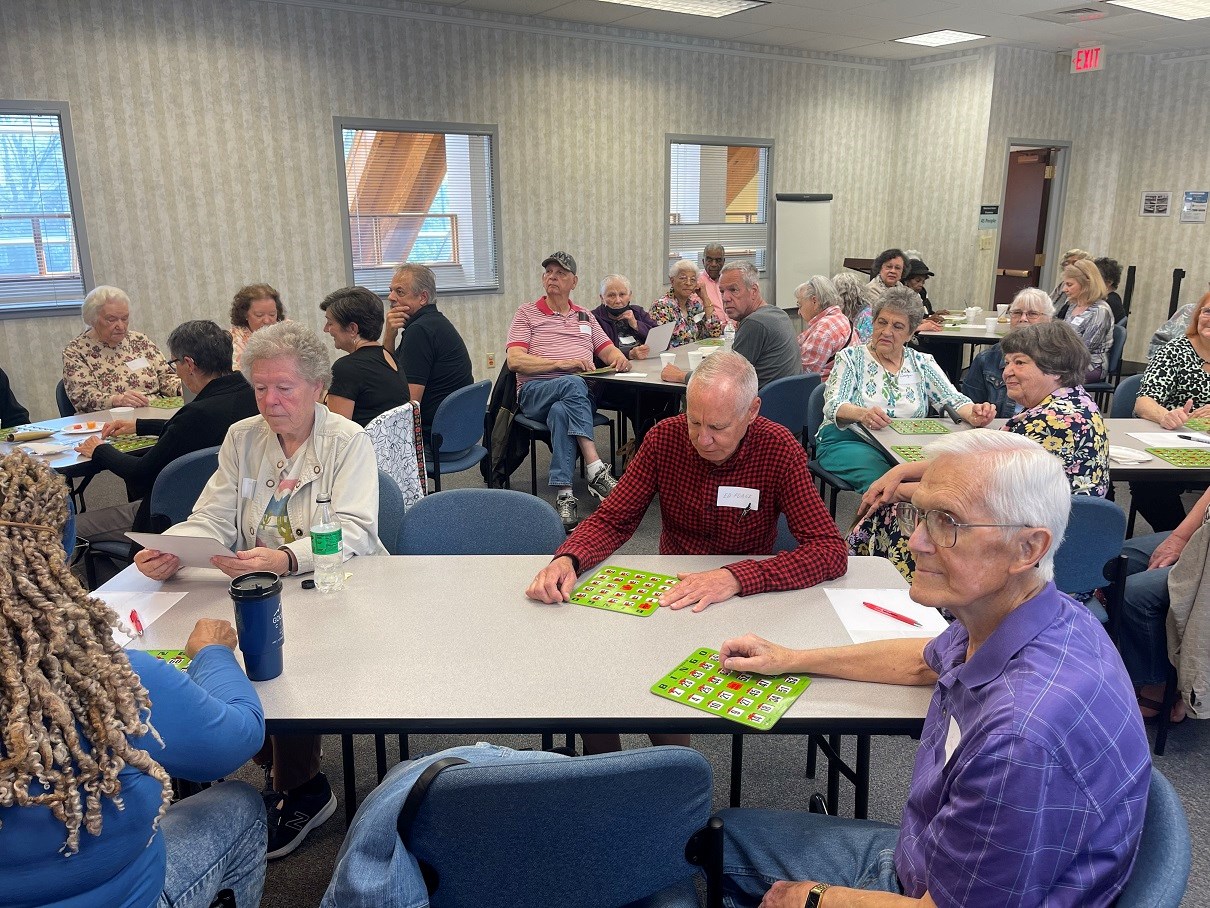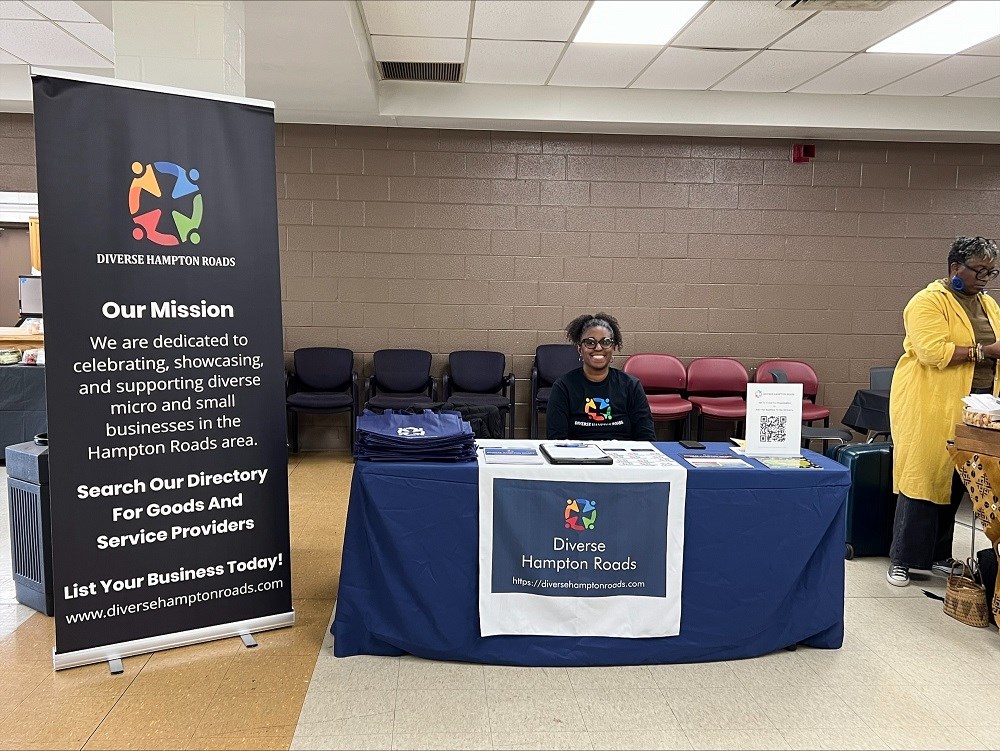|
|
 |
|
September 2024 |
|
|
 |
Adult Services Notes |
|
|
|
Library of Virginia Training |
|
|
|
Getting Up to Speed with Generative AI
|
|
|
The landscape around artificial intelligence seems to be changing daily, and libraries are increasingly seeing questions about what AI is, how it works, what can one do with it, how to use it ethically, and is it going to take over the world.
To address at least the first four questions, we have put together a series of programs that will offer attendees an introduction to generative AI, look at ethical questions around using AI, examine how to use AI safely, and explore some potential programing opportunities using AI.
|
|
|
Presenters include Rebecca Schneider, Jessica Beavers, and Sonya Coleman from the Library of Virginia and Reed Hepler from the College of Southern Idaho. See program descriptions, dates, and registration links below.
| |
|
|
An Introduction to Generative AI in Public Libraries
Tuesday, Sept. 10, 2024 01:00 PM ET
Library of Virginia reference librarian Becky Schneider will provide an overview of generative AI tools such as ChatGPT and DALL-E. She will discuss the strengths and limitations of generative AI, as well as the key information literacy competencies to aid library staff and users in their encounters with these new technologies. |
| Register |
|
|
|
The Three C's of AI-Generated Content: Copyright, Citation, and Circumspection
Tuesday, Sept. 17, 2024 01:00 PM
Reed Hepler, digital initiatives librarian, instructional designer, artificial intelligence practitioner and consultant, will discuss the implications of copyright on AI; the need for, and implications of, citation or acknowledgment of AI use, and the importance of being circumspect about data privacy, confidentiality, and quality control and other issues. Reed has been called by some "the most 'anti-AI' AI proponent." His goal in this discussion is help you become the same by taking about both benefits and hazards. |
| Register |
|
|
|
AI Ethics in a Digital World
Tuesday, Sept. 24, 2024 01:00 PM
Jessica Beavers, Information Security, Risk, and Compliance Manager at the Library of Virginia will explore ethical implications and cybersecurity challenges surrounding the use of AI in today's digital landscape. In this eye-opening presentation we delve into real-life examples, discuss regulatory frameworks, and explore best practices for ensuring responsible and secure AI implementation. |
| Register |
|
|
|
Using AI in Library Programming
Tuesday, Oct. 1, 2024 01:00 PM
Join Sonya Coleman, Digital Engagement Coordinator at LVA, to explore new programming ideas that demonstrate artificial intelligence tools and provide hands-on instruction. By pairing historical descriptions and AI image generation tools, participants learn to create potential images based on historical resources. Through using these generative AI tools, participants can better understand the limitations as well as possibilities of new technology, thereby becoming more savvy consumers of information in the digital world. |
| Register |
|
|
News from Library Development & Networking
|
|
|
RUSA Online Training Reports
|
|
|
In partnership with ALA's Reference and User Services Association, LDND is delighted to offer training opportunities for Virginia library staff.
Scholarship recipients are asked to report out on key points or topics from the programs they attend. Read the reports below. |
|
|
| Reference Interview 101
Charlie Hall, Hampton Public Library
Here are some the highights of the Reference 101 class:
50% of all reference questions are answered incorrectly. The ‘success’ of a reference interaction is not measured on the accuracy of the response, but rather the level of service and manner in which the answer is obtained.
A patron who is treated kindly and with respect is more likely to return in the future. A patron who knows they have received an incorrect answer may still perceive the interaction as a net positive if: the worker was a pleasure to interact with, the reasoning provided to get to that answer was explained and sound, the resources provided proved to be otherwise helpful, if the patron felt as if the worker was mutually interested in achieving the goal at hand, and generally, if they walked away from the interaction with something they didn’t have before. The question being asked by the patron may not be the question they actually want to ask. It’s important that reference interviews take place during initial contact with a patron, in order to determine the proper course of action.
For example, a patron asking for books on fish is not as simple a question as it appears. Are they interested in fishing? If so, what type of fishing? Are they looking to fish locally, in more distant locations, or even commercially? Perhaps they’re curious about marine biology or want to set up a freshwater aquarium in their house and need information on proper husbandry.
A worker who asks no questions and directs the patron to information on fly fishing provides poor service. While they may have gotten lucky and answered the patron’s request correctly, it’s far more likely that the patron was interested in a different subject. Once a worker at the reference desk provides a poor level of service, they break the trust between them and the patron, who may not return to the desk in the future. A worker that asks questions and reveals the patron’s true request is providing excellent service. Even if the worker is unable to provide the information sought after, such as not having a book or resource on the subject, the patron will be more likely to return in the future, having been understood and worked with. When conducting a reference interview with a patron it’s important that the worker repeats the question back to the patron. This allows for the patron to review the request they’re making and for the worker to confirm the topic they’re searching for information on. The way a worker responds to a question is key. It is important that the worker imparts no judgement upon the patron’s request. The patron may be nervous to approach the desk, and scared off from approaching in the future if the worker has a reaction to the information requested. All questions should be treated impartially. |
|
|
| Quiet Leadership
Amanda Green, Hampton Public Library
I would first like to offer my thanks to the Library of Virginia, who provided me with the opportunity to attend this workshop. I found the presentation, slides, and comments to be very thought-provoking about the challenges faced by introverts in leadership positions (and in the broader workplace). My Meyers-Briggs score (INTJ) and Clifton Strengths Finder results (1st, “Learner”) align with my chosen career in library sciences. In addition to my MLIS, I also have a Ph. D. in Interdisciplinary Archaeological Studies and an M. A. in Ancient Studies and Museum Studies. I am drawn to research and analysis, which are not always perceived as the most favorable attributes for leadership positions. I tend to assume that my colleagues have skill levels adequate for their assigned tasks; the management quiz that we completed during the presentation reflected my preference for the “Laissez Faire” management style. The there are inherent risks in this approach – projects might fall behind, and deliverables could be delayed. It is important to monitor less-experienced employees to ensure that they have the tools and support necessary to complete their tasks successfully. As an introvert, I must make the effort to move out of my comfort zone to interact more fully with my team. I found the suggestions relating to meeting preparation to be very useful and insightful.
Another aspect of quiet leadership is something that I myself have experienced recently: the impact of health situations in the workplace. Though I would prefer to keep my own health issues to myself, I did feel it important to share some information with my work colleagues. I was diagnosed with breast cancer in the spring, and I knew that the treatments would affect my work performance. It is also helpful to demystify cancer for others. It is not an automatic death sentence, and current treatment protocols have a good chance of success with early detection. I answered any questions, provided updates when asked, and let everyone know when I was affected by radiation fatigue. Introverts must make conscious choices to be more outgoing (challenges not experienced by extroverts), but our thoughts and ideas do not have less worth because of this. I value my ability to synthesize information from a variety of sources, but I have learned not to offer my conclusions too early in discussions. Extroverted thinkers need more time and external input to work through problems.
Once again, I am very grateful to the Library of Virginia for offering this training opportunity. I will continue to think about the issues raised in the presentation in the months and years to come, and I appreciate the professional tools this training provided.
|
|
|
| Learning about AI: Level Up Your Skills Without Overwhelming Your Mind
Bethany Hawkins, Loudoun County Public Library
This was my first foray into AI beyond the auto-generated AI I’ve been seeing on various social media sites and Google. I must confess I was a sceptic. This training has given me insight and inspired me to make use of the various platforms. I was able to test out ChatGPT and Perplexity during the training, and I was pleasantly surprised with the information provided by the platforms.
The training was led by Jennifer Freer and Lara Nicosia, both librarians at New York Universities in Rochester. They volleyed back and forth throughout the training, each providing thoughtful insight into the world of AI. They shared their own experiences of exploring AI and their reasons for doing so. Overall, they were positive about the technology and approached it in a way that had me feeling positive about it as well.
Jennifer and Lara started out by giving a simple overview of what exactly AI is and then continued to familiarize those in the training with some of the terminology and lingo that is referenced by AI users. They separated the terms into three categories: Conceptual (Machine Learning, Natural Language Processing, etc.), Technical (Algorithm, Generative AI) and Interaction and Challenges (Prompt, Response, Bias, etc.). I found this jargon to be useful in helping me think about AI as a technological tool rather than as an abstract idea, which is pretty much the impression I’ve had up until now. Until this training, AI exploration felt intimidating to me.
After learning about the lingo, we went on to learning the various landscape options for usage of AI. The categories we reviewed for this portion of the training were: Generative Text (ChatGPT), Generative Images and Videos (Adobe Firefly), Generative Search (Perplexity) and Literature Discovery (scite.ai). We were given an overview of how AI works in code and then shown how to get the results you want based on the tools needed for the task they’re being used for. We then were able to do an exercise using ChatGPT and Perplexity as a test. I asked the same question on both platforms and was given a mostly correct answer from ChatGPT and then a more descriptive answer from Perplexity with citations. I had asked a question about an author’s book.
Overall, this training was enlightening, and the presenters did a wonderful job of providing the current information about AI. I was happy that they included an interactive piece to the training so we could have some hands-on experience with the platforms. As a member of the Adult Services Department in my public library system, I think that AI will certainly come in handy. I’ve already been testing it out for readers' advisory questions and book discussion questions. I’m sure as we continue to provide information to the community at large, we will be able to make use out of various AI tools. |
|
|
|
|
Where do you start when a user comes in with a general interest question? From students with high school research projects to lifelong learners, Explora Public Libraries from EBSCO has you covered.
With an easy-to-use search tool and Topic Overviews for popular searches, Explora makes research simple and offers enhanced accessibility with translation tools and read-aloud options. |
|
|
Part of LVA's Find It VA collection, the Explora user interface searches EBSCO's MasterFILE and Read It databases, providing access to hundreds of reference e-books as well as full-text articles from thousands of reputable magazines and journals, including Consumer Reports, Better Homes & Gardens, People, TIME, Sports Illustrated and U.S. News & World Report. You and your patrons will find reliable information on a variety of topics to help with research for school, jobs, or when they simply want to learn something new.
If you need marketing materials for promoting Explora to your patrons, you can find social media posts, bookmarks, and more in EBSCO Connect. Be sure to talk with your local high school librarians about how their students can access Explora through the public library, and if they want to include direct links to Explora, have them contact Barry Trott at LVA.
|
|
|
|
A Mindful Approach to Stress
|
|
|
Contrary to public impressions, library work can be stressful in lots of ways. Add to that, the stresses of living in contemporary society, and it can be difficult not to feel anxious and overwhelmed.
This webinar from the People Connect Institute (PCI) looks at "the science of stress and how to use mindfulness as a tool to reduce its grip on your day to day." |
|
|
Take some time to seek out a more peaceful life and ease anxiety.
|
|
|
| Access the Webinar
| Niche Academy is open to all Virginia library staff members and library associates such as trustees and Friends board members. If you do not have a Niche Academy account, please use your library email address to sign up. If you do not have a library work email, you may register with a personal email, and we will contact you to confirm that you are affiliated with a Virginia library. |
|
|
|
|
Did you know that the Library of Virginia has multiple traveling exhibitions available for display at public libraries? We currently have two open timeslots for the Lantz Mills Deaf Village exhibition: 10/21/2024–11/30/2024 and 1/13/2025–2/22/2025.
This six-panel traveling exhibition features the history of prominent deaf villagers in the Shenandoah County community of Lantz Mills, the involvement of deaf community members in local businesses, and even a budding romance. Each panel includes a QR code that links to ASL interpretation of the text featured. Please contact exhibitions coordinator Barbara Batson for more information: barbara.batson@lva.virginia.gov or 804.692.3518.
|
|
|
|
|
Digital Literacy Workshop Incentives |
|
|
In partnership with AT&T, the Public Library Association (PLA) is once again offering incentive grants to "provide the funding and resources necessary for libraries to teach basic digital literacy skills using PLA's DigitalLearn courses and training materials."
In the words of a 2023 grant recipient "We were able to reach members of the community who don't often visit the library, and the response was overwhelmingly positive."
|
|
|
Two types of grants will be awarded:
Teach Selected DigitalLearn workshops
50 Large Libraries will be awarded $10,000 to reach 75 learners 50 Small Libraries will be awarded $5,000 to reach 30 learners Enable Digital Navigators utilize DigitalLearn materials (Libraries must already have a Digital Navigator to apply)
Read more about this program and apply. The application period closes on October 18, 2024. |
|
|
Readers' Advisory Tips and Tricks
|
|
|
Using Appeal Factors in Readers’ Advisory Work |
|
|
As we head into fall, it can be a good time to refresh our RA skills and think about how we can build our community of readers. Appeal factors are the foundation of much of the work we do as readers' advisors.
Appeal as a concept was developed by Joyce Saricks and Nancy Brown in their book Readers’ Advisory Service in the Public Library (1989). Duncan Smith, the founder of NoveList, said that the concept of appeal was “groundbreaking because it shifted the focus [on reading] away from the material to the experience.” That is, it enables us to think about the reader as much as about the book (or audiobook or film, appeal is applicable to any medium that someone uses to interact with story). We use appeal both to connect readers with titles that engage them and also to connect books into lists and displays. |
|
|
Here are some of the advantages of using appeal as a tool to think about books and reading:
- Appeal offers a different, non-subject-based, way to think about books
- Can be useful when you start branching out into areas of reading that you are less familiar with
- Helps you become a better reader by understanding why you like a book (or perhaps dislike it)
- Gives you and the reader a language to be able to articulate what grabs them about books they like
- Makes you a better readers’ advisor as you can more easily help readers make connections between what they are currently reading or interested in and new titles or authors
When you are working with a reader, you may have noticed that many readers are not so much looking for a book on a certain subject as looking for a book that “feels” a certain way. Here are the traditional appeal elements and some ways to start thinking about them:
Story
What type of story is being told? Funny, sad, violent, etc. Does the story emphasize people or situations? Focus of the story — interior/psychological vs. exterior/action- oriented. Character
Are characters stereotypes (easily recognizable) or developed slowly over the book? Single main character vs. several characters whose stories intertwine. Point of view of the narration. Characters followed from book to book in a series. Does the reader observe or identify with the characters? Setting Mood
How the reader responds to the book Atmosphere – scary, cozy, romantic, etc. Tone of the book – humorous, dark, light, thoughtful, etc. Language
Dialogue vs. description -- lots of dialogue moves the plot along more quickly. Plot progression -- straight forward or are there lots of twists and turns, flashbacks, multiple plots? Length of sentences, paragraphs, chapters.
Read more about how to use Appeal and other Story Elements to strengthen your RA skills.
|
|
|
|
Musical Bingo for Aging Adults |
|
|
The Green Sea Floyds Library in Georgia has developed an interesting program to exercise memories and enhance the mental well-being of local seniors.
Here's librarian Melissa Shenk's description of the program: "Musical Bingo is part of the library's bi-monthly program series with the Horry County Council on Aging-Green Sea Floyds. |
|
|
Most programs include aspects of cognitive development, including Musical Bingo. The music played is what these participants would have heard in high school. Happier memories, better moods, a desire to socialize, and general mental and physical well-being are all enhanced by music."
Read more about how you can replicate this program. |
|
|
Featured Virginia Programs
|
|
|
Prince William County Public Libraries
|
|
|
|
Prince William's Bad Art Night is a program the celebrates creativity without the pressure of perfection. Whether they are a seasoned artist or someone picking up a brush for the first time, everyone is welcome to join in the fun. Participants release their inner artist and let their imaginations run wild! Attendees either bring art supplies or use the library's. For those who work better with some direction, an art prompt is always provided.
|
|
|
For more info, contact Thymie Truong, ttruong@pwcgov.org
|
|
|
Alleghany Highlands Regional Library
|
|
|
Mountain Toppers Healthy Aging |
|
|
Our library partnered with the Alleghany Highlands YMCA - Healthy Highlands Initiative, and Connections Plus Healthcare + Hospice to create a monthly program that includes bingo, lunch, and a health chat from rotating area agencies and resources. We wanted to create something that our seniors could look forward to each month, that would provide them with fun, social interaction and valuable health and lifestyle information.
We were amazed by the turnout for our kick-off event, with 39 seniors participating! We used the first meeting to discuss topics which they would like to see covered in their chats and activities. Some of their ideas included financial and estate planning, nutrition/The Blue Zone, chair yoga, crafts, technology tutorials, and community resources in general. Everyone seemed to love being together we had several comments thanking us for creating something to get them up, out of the house and moving! We are excited to see what is to come for this group! |
|
|
 |
For more info, contact Lisa Sponaugle, lsponaugle@ahrlib.org |
|
|
|
Local Black Business Expo |
|
|
The Park Place branch of the Norfolk Public Library hosted a Local Black Business Expo in honor of Black History Month on February 16th.
The event highlighted local black owned businesses, services, and products in the Park Place community and provided a space for networking and community connection. |
 |
|
|
For more info, contact Lavonne Edmonds, Lavonne.Edmonds@norfolk.gov
|
|
|
|
| Recent articles on topics of interest to Adult Services |
|
|
|
This newsletter is made possible by a grant from the U.S. Institute of Museum and Library Services. It is published by the Library of Virginia Library Development and Networking Division.
|
|
|
|
|
|
|
|
|